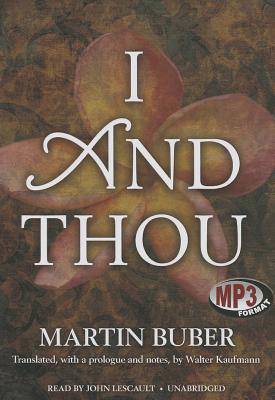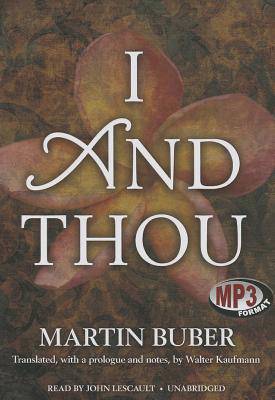
- Afhalen na 1 uur in een winkel met voorraad
- Gratis thuislevering in België vanaf € 30
- Ruim aanbod met 7 miljoen producten
- Afhalen na 1 uur in een winkel met voorraad
- Gratis thuislevering in België vanaf € 30
- Ruim aanbod met 7 miljoen producten
Zoeken
Omschrijving
Martin Buber's I and Thou has long been acclaimed as a classic. Many prominent writers have acknowledged its influence on their work; students of intellectual history consider it a landmark; and the generation born after World War II considers Buber one of its prophets. Buber's main proposition is that we may address existence in two ways: (1) that of the "I" toward an "It," toward an object that is separate in itself, which we either use or experience; (2) that of the "I" toward "Thou," in which we move into existence in a relationship without bounds. One of the major themes of the book is that human life finds its meaningfulness in relationships. All of our relationships, Buber contends, bring us ultimately into relationship with God, who is the Eternal Thou. The need for a new English translation had been felt for many years. The old version was marred by many inaccuracies and misunderstandings, and its recurrent use of the archaic "thou" was seriously misleading. Professor Walter Kaufmann, a distinguished writer and philosopher in his own right who was close to Buber, retranslated the work at the request of Buber's family. He added a wealth of informative footnotes to clarify obscurities and bring the reader closer to the original and wrote an extensive prologue that opened up new perspectives on the book and on Buber's thought. This volume provided a new basis for all subsequent discussions of Buber.
Specificaties
Betrokkenen
- Auteur(s):
- Vertaler(s):
- Uitgeverij:
Inhoud
- Taal:
- Engels
Eigenschappen
- Productcode (EAN):
- 9781455112418
- Verschijningsdatum:
- 1/10/2011
- Uitvoering:
- CD
- Formaat:
- MP3-formaat
- Afmetingen:
- 135 mm x 190 mm
- Gewicht:
- 90 g

Alleen bij Standaard Boekhandel
+ 86 punten op je klantenkaart van Standaard Boekhandel
Beoordelingen
We publiceren alleen reviews die voldoen aan de voorwaarden voor reviews. Bekijk onze voorwaarden voor reviews.











